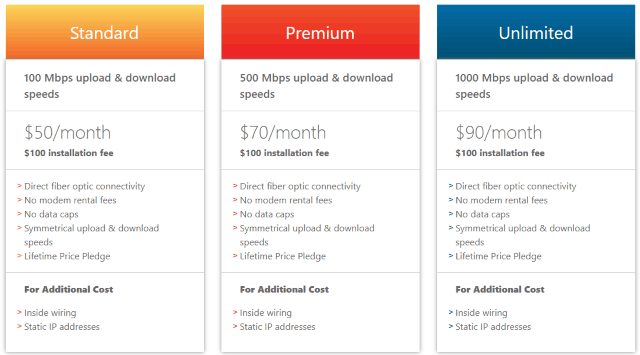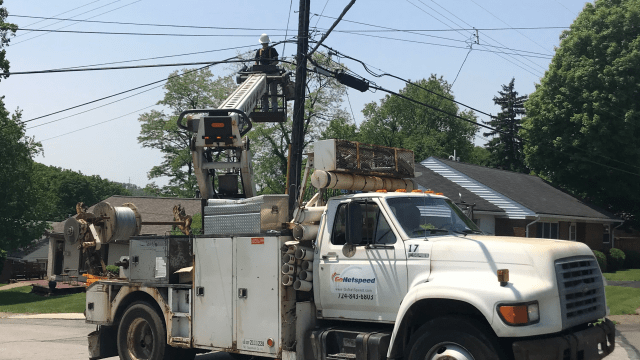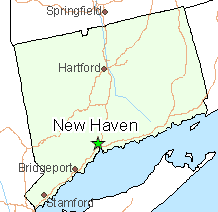Broadband service is available to 99.1% of the Bronx and 99.8% of the Rochester and its suburbs, but just 38.5% of Bronx residents are using the internet at broadband speeds (at least 25/3 Mbps) and only 54% of Monroe County residents are receiving a true broadband experience.
These two New York communities, one in the dense New York City area, the other straddling the Finger Lakes region and Western New York, are examples of the FCC’s vast over-count of consumers getting suitable broadband service and speed, according to Microsoft. The problem is much worse in rural areas where DSL speeds predominate and providers like Verizon and Frontier are in no hurry to upgrade their rural networks.
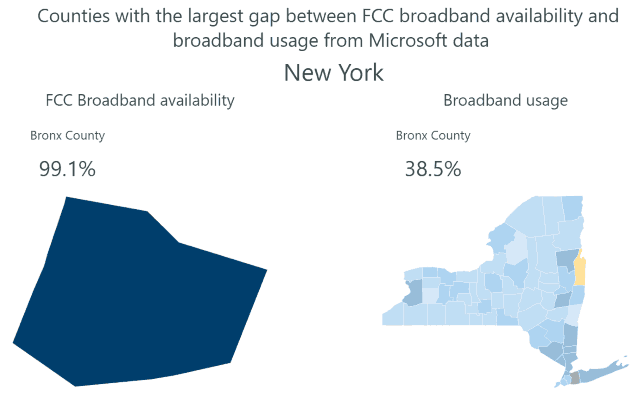
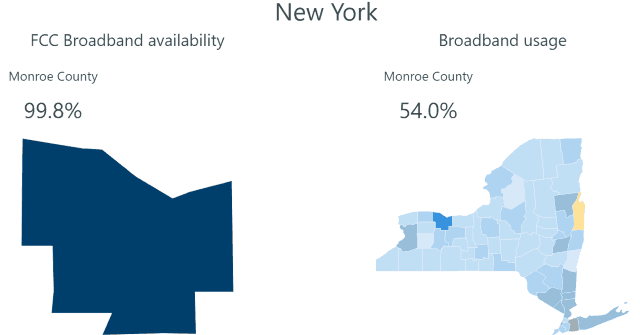
“These significant discrepancies across nearly all counties in all 50 states indicates there is a problem with the accuracy of the access data reported by the FCC,” Microsoft said about its findings. “Additional data sources like ours, as well as work by others to examine data in a few states or regions, are important to understanding the problem.”
Microsoft’s performance data is not alone representative of a local cable company not delivering advertised speeds. For example, in the Bronx, affordability issues mean that more residents rely on their cell phones and mobile connectivity for internet access. In Rochester, where true broadband speeds usually cost $50-65 a month depending on the provider, affordability is also a factor. But there is also the presence of local telephone company Frontier Communications, which has saddled Rochester with inferior DSL service it has no concrete plans to upgrade. Frontier DSL usually offers substandard speed of 12 Mbps or much less, making its customers part of Microsoft’s estimation of those underserved.

Schumer
Sen. Charles Schumer (D-N.Y.) complained about the state of broadband in New York, claiming internet speeds are “horrible” in much of the state and broadband providers are not being honest about advertised speed.
“When there’s slow internet, it drives you crazy. You just sit and wait and wait and wait. It’s horrible,” Schumer said at a news conference held Sunday in Manhattan. “There’s a new report out that says our internet here in New York may be moving more like molasses than like lightning.”
Schumer is taking direct aim at the recent positive report from the FCC that broadband has dramatically improved in the United States, a conclusion the Republicans serving at the FCC took credit for, explaining policies of deregulation and elimination of net neutrality spurred private investment and better internet service for all.
“But Microsoft did its own report, and it shows that over four and a half million New Yorkers and Long Islanders are not getting the speed on the internet that the carriers say they’re getting, [and] that’s a real problem,” Schumer argued, adding that most consumers are not getting consistent access to at least 25/3 Mbps service. “It’s like paying for the speed of a car but getting the speed of a bicycle.”
Schumer wants the FCC to hold providers to account for their broadband speed and performance. But last week, the FCC had other ideas, delaying broadband performance testing requirements until 2020 for internet service providers receiving taxpayer or ratepayer funds to build out their networks.
“The FCC is falling down on the job,” Schumer said. “I don’t think it’s nefarious but the providers, to upgrade to the required speed, would have to pay for more equipment. They should. We’re all paying big bills for that.”


 Subscribe
Subscribe One of Frontier Communication’s largest legacy service areas is suffering from some of the same bad service reported by rural communities in states like California, Minnesota, and Florida.
One of Frontier Communication’s largest legacy service areas is suffering from some of the same bad service reported by rural communities in states like California, Minnesota, and Florida. It was the leading story on local newscasts up and down New York State — Charter Spectrum, accused of failing to provide the internet speed and reliability it promised agreed to pay $174.2 million to settle a lawsuit filed by the New York Attorney General’s office.
It was the leading story on local newscasts up and down New York State — Charter Spectrum, accused of failing to provide the internet speed and reliability it promised agreed to pay $174.2 million to settle a lawsuit filed by the New York Attorney General’s office.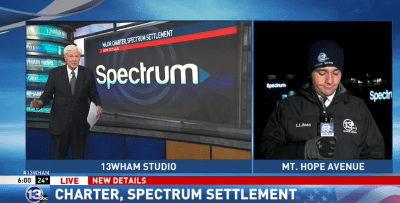
 The apparent lack of a firewall and a potential written or unwritten/understood policy interfering with coverage of legitimate news is a serious blow to Spectrum News’ credibility. There is no legitimate reason we can find for Spectrum News to “miss” stories about its parent company, and in some instances reporters merely need to cross the building to interview local executives.
The apparent lack of a firewall and a potential written or unwritten/understood policy interfering with coverage of legitimate news is a serious blow to Spectrum News’ credibility. There is no legitimate reason we can find for Spectrum News to “miss” stories about its parent company, and in some instances reporters merely need to cross the building to interview local executives. Spectrum customers living in areas wired for fiber optics get substantially better discounts for longer periods of time than those living in areas where anemic phone company DSL service is the only competition.
Spectrum customers living in areas wired for fiber optics get substantially better discounts for longer periods of time than those living in areas where anemic phone company DSL service is the only competition.
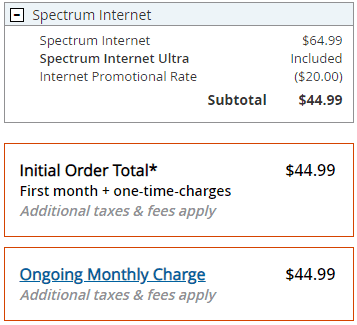
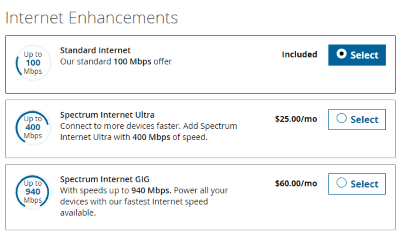
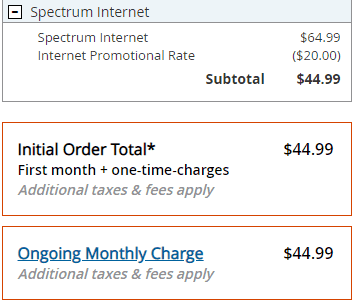
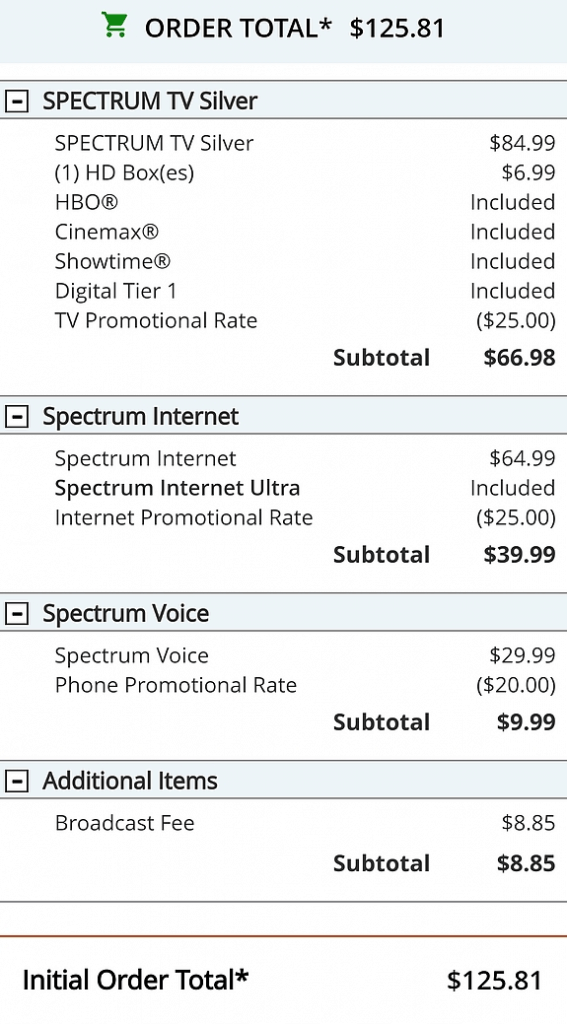
 A Rochester, N.Y.-based broadband company founded by an ex-president of Time Warner Cable and a former top executive at Rochester Telephone is bringing broadband competition to thousands of residents in Connecticut and Pennsylvania through its fiber-to-the-home network.
A Rochester, N.Y.-based broadband company founded by an ex-president of Time Warner Cable and a former top executive at Rochester Telephone is bringing broadband competition to thousands of residents in Connecticut and Pennsylvania through its fiber-to-the-home network.